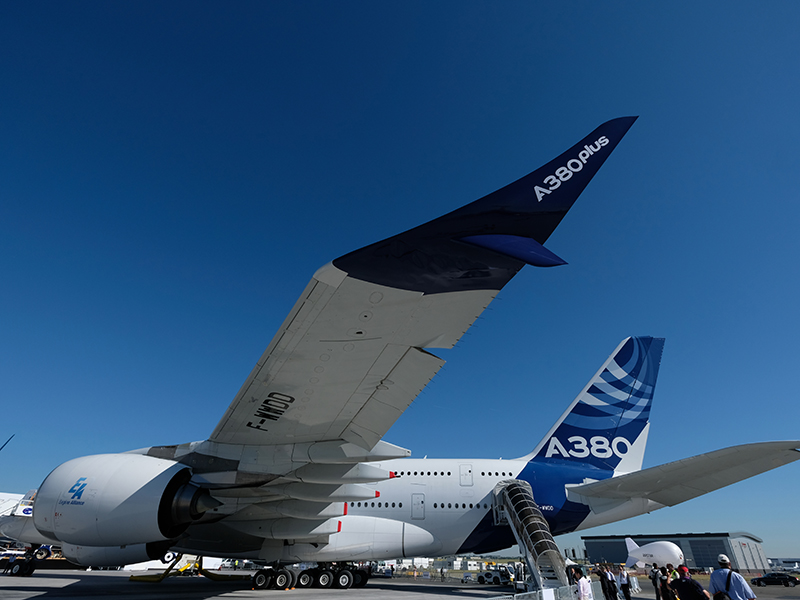Boeing and Airbus at odds over the future of aircraft manufacturing
At the Paris Air Show, Boeing and Airbus have lain out starkly different plans for the future of commercial aviation

An Airbus A380 fitted with an A380plus wingtip at the Paris Airshow. The winglets are designed to reduce fuel consumption
Both Boeing and Airbus have unveiled updated models of their planes at the 2017 Paris Air Show and shown very different focuses for the future. While Airbus has upgraded its biggest model, Boeing instead has focussed on smaller and more efficient planes. The new jets come as the international aviation industry is showing signs of cooling, with orders for new planes slowing down.
Just ahead of the show Airbus unveiled the A380plus, an upgrade of its A380 superjumbo with more efficient aerodynamics and 80 extra seats. The most noticeable changes to the plane are added winglets to the tips of the main wings, which Airbus claims will help the plane burn four percent less fuel than the old model.
The biggest passenger jet in the world, the A380 has seen its sales slump as airlines instead opt for smaller, more efficient twin-engine planes. The new A380 is an attempt to help larger planes make more economic sense, with Airbus claiming the overall improvements will cut costs for airlines by 13 percent per seat. Additionally, Airbus said the growing number of passengers in Asia and the Middle East will require jets with greater capacity, as airports in the region are already very congested.
The A380 has seen its sales slump as airlines instead opt for smaller, more efficient twin-engine planes
Boeing has taken a different direction with the launch of a new version of the twin-engine 737, the 737 Max 10. The Max 10 is 66 inches longer than the older Max 9 and has 10 extra seats, however the added size gives it a slightly smaller range. Boeing claims the model is extremely efficient and will have the lowest operating cost of any single-aisle plane ever produced
According to Bloomberg, Boeing has focussed on the 737 due to the lack of demand for jumbo passenger jets (such as its famous 747), and have even gone so far as to drop the four-engine plane category from its annual forecast. “We don’t see much demand for really big aircraft going forward’,’ said Randy Tinseth, Boeing’s Vice President for Marketing. “We find it hard to believe that Airbus will deliver the rest of their A380s in backlog.”
Slowing sales have taken their toll on Boeing, with the company announcing hundreds of layoffs in April. Declining demand for A380s has also seen Airbus recently contemplate slowing down production of its plane. Both manufacturers hold an effective duopoly over the commercial aviation industry, with no close competitors.













